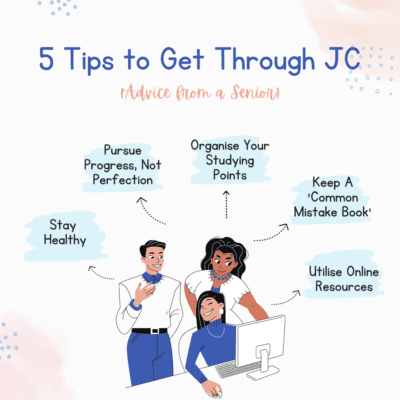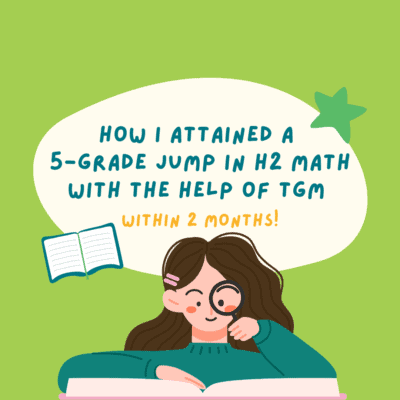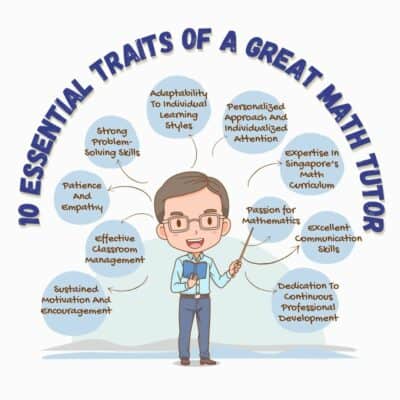It goes without a doubt that JC can be demanding and taxing on all of us, especially with subjects like Project Work and GP (General Paper). While that might be so, there are ways to go around it to make it more enriching and less tiring!
As someone who recently used to take O and A Level examinations, I recognise how rigorous the studying may be. Without waiting any longer, here are 5 neat tips to getting through JC (advice that I wished I had heeded earlier on)!
1. Stay Healthy
To put it simply, a healthy body fuels a healthy mind. In order to avoid burnouts and fatigue when studying, it’s important to ensure that your body is treated well.
I, personally, relate to and understand how easy it might be to neglect one’s health when he/she is so consumed by work on a daily basis. However, it took me quite some time to realise that it is not an either-or dichotomy. For me, when I was a student, I tried to incorporate aspects of a healthy lifestyle to my daily schedule! Here’s some ways that I did it:
- Stay Hydrated
- start every morning with a full glass of water (~500ml)
- have a 1 litre bottle next to me as I’m studying, and making it a point to consume at least 1.5 bottles a day
- Getting Sufficient Rest
- go to bed at the same timing every night (11pm), even when I may not feel that tired
- wake up at the same timing every morning (4.30am), as I study better in the quiet morning
- Get Myself Moving~
- stretching sore parts of my body throughout the day (neck, shoulder, back)
- going for a short walk after studying every night (~30min after I stop studying at 10pm)
While these ways worked for me, it may not for you. Feel free to make changes to it here and there, and find a way that suits you best!
The pursuit of academic excellence can be a lonely one. Besides ensuring that you are well-nourished and physically healthy, I also think it’s important that we all do not neglect the significance of spending time with your family and friends. After all, you’re only young once and there’s so much to life beyond studying! That is not to say that doing well in school isn’t a priority, but rather, have everything in moderation.
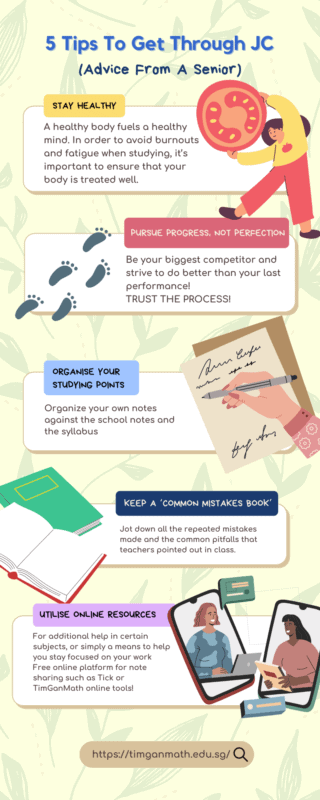
2. Pursue Progress, Not Perfection
Inevitably, when put in such a competitive environment, we may catch ourselves envying others and their successes, and consequently feeling inadequate about ourselves. Reflecting back on my O and A Level days, I wished that I had focused a bit more on what I achieved, instead of what I did not. However, that is not to say that you shouldn’t be ambitious or aim to do better, but rather, not measure the significance of your achievements solely against your peers.
‘Comparison is the thief of joy’ – I truly believe that I would have found more joy in learning if I wasn’t constantly stressing about how well I did against my peers. Frankly speaking, there’s always going to be someone better than you at something, and there is no point feeling defeated over it. Instead, be your biggest competitor and strive to do better than your last performance! Trust the process!
And whenever you perform below your expectations, take time to recover and have the resilience to pick yourself up again. It may be a bad day, but it sure isn’t a bad life! 🙂
3. Organise Your Studying Points
We all know that many JC subjects tend to be quite content-heavy, and as a result, many of us struggle to keep up with everything we’re supposed to know. Personally, when I was in JC, I noticed that whenever I drafted up my own notes, it was not uncommon for me to miss out key details in them from time to time.
To prevent this, organise your own notes against the school notes and the syllabus! Looking back, keeping a set of the subject syllabus not only serves as a checkpoint for me to keep track of my work, but was also used as a means for me to test how much I’ve learnt. After my revision for each chapter, I would test my knowledge of it against the point forms in the syllabus, and from there, identify which parts I had to work on more. In my opinion, this method of organisation is best used for Humanities and Science subjects.
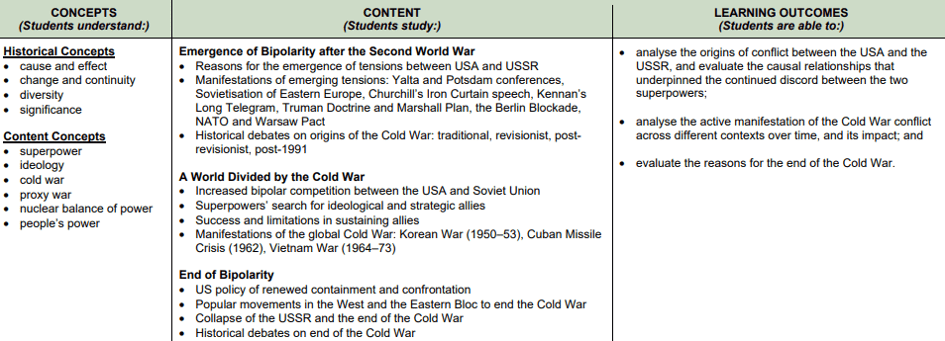
4. Keep A ‘Common Mistakes Book’
For almost every subject I took, I made sure that I had a ‘Common Mistakes Book’ for it. There, I jotted down all the repeated mistakes I made and the common pitfalls that my teacher had pointed out in class. I found recapping this book right before my examinations to be especially useful as I could make a mental note to ensure that I will not make the same mistakes.
In particular, this method of learning helped the most in my understanding of Mathematics, a subject where topics are often intertwined with one another, and where the consequences of a fundamental misconception could snowball in time to come.
5. Utilise Online Resources
In such a technologically advanced society, it is without a doubt that the digital space has been heavily infused in our learning. With an abundance of free online studying tools found on the Internet, you can receive the necessary guidance with the help of a simple click. Whether you’re looking for additional help in certain subjects, or simply a means to help you stay focused on your work, there are definitely online materials out there that can help facilitate your learning needs.
If you’re like me, and have trouble focusing on your work for long periods of time, perhaps you can look towards streaming study-related content on Youtube alongside your work. For example, when I was in JC, I found it especially useful to stream study vlogs when I was studying through the night as it made the studying process one that was less lonely – and this motivated me. Alternatively, some of my friends have also turned towards using the famously-known Pomodoro technique to stay disciplined to their work and avoid burnouts.
This technique may work for you if you have a shorter attention span as it alternates between time dedicated to focusing and resting, as well as ensuring that you’re not overworking beyond your optimal productivity. While I’m not an expert in this field, you can find out more about which studying method suits you best with this quiz!
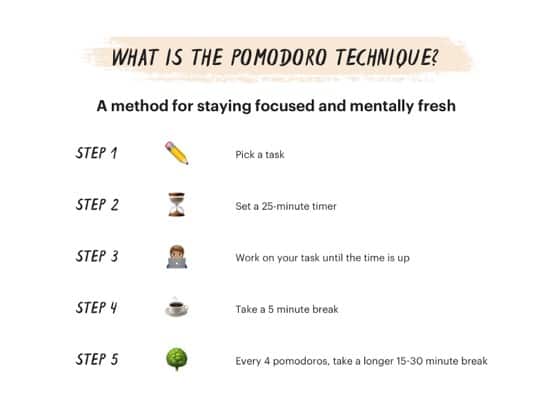
Other online content that I wished I had taken advantage of at an earlier time include notes from other schools/seniors and tools to facilitate my learning. A free online platform for note sharing I would recommend is Tick.
To give you a brief insight to Tick, it has a wide range of notes collected from over the years, which covers a multitude of subjects and syllabi. Ranging from summary notes to essay plans, Tick offers a myriad of resources that will definitely encompass something that suits your learning needs.

Last but not least, if you’re looking for online resources to guide your learning for H2 Mathematics, do visit our website to access our wide range of FREE resources! There, we offer
- Downloadable Topical Worksheets – which contains 100 essential H2 Math questions, that is accompanied by video explanations and handwritten solution
- Mini-Course on Vectors – an insight to experience learning the most content-heavy topic of H2 Math with us
- H2 Math Question Bank – a pool of questions asked by our students and explained by Mr Gan
- Blog – for helpful tips and tricks to tackle H2 Math, like our latest ones on the 5 Best Free H2 Math Online Tools for Any JC Student and How to Use MF26 Like a Pro!
Conclusion
With all that being said, I hope that you have some takeaways from this blog! We all know that the 2 years spent in JC can be an excruciatingly stressful one, but that doesn’t mean that you shouldn’t have fun too; school life goes beyond just studying! 😊

